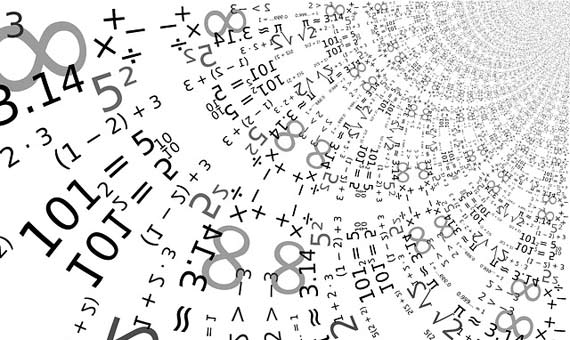Hasta el latín hay que marcharse para poder encontrar el origen etimológico del término matemáticas, ya que emana de “mathematicalis”. No obstante, esta palabra a su procede del griego, de “mathema”, que puede traducirse como “estudio de un tema”.
La matemática es la ciencia deductiva que se dedica al estudio de las propiedades de los entes abstractos y de sus relaciones. Esto quiere decir que las matemáticas trabajan con números, símbolos, figuras geométricas, etc.
A partir de axiomas y siguiendo razonamientos lógicos, las matemáticas analizan estructuras, magnitudes y vínculos de los entes abstractos. Esto permite, una vez detectados ciertos patrones, formular conjeturas y establecer definiciones a las que se llegan por deducción.
Además de lo expuesto no podemos pasar por alto que existen dos importantes tipos de matemáticas:
• Las matemáticas puras, que se encargan de estudiar la cantidad cuando está considerada en abstracto.
• Las matemáticas aplicadas, que proceden a realizar el estudio de la cantidad pero siempre en relación con una serie de fenómenos físicos.
Las matemáticas trabajan con cantidades (números) pero también con construcciones abstractas no cuantitativas. Su finalidad es práctica, ya que las abstracciones y los razonamientos lógicos pueden aplicarse en modelos que permiten desarrollar cálculos, cuentas y mediciones con correlato físico.
Podría decirse que casi todas las actividades humanas tienen algún tipo de vinculación con las matemáticas. Esos vínculos pueden ser evidentes, como en el caso de la ingeniería, o resultar menos notorios, como en la medicina o la música.
Es posible dividir las matemáticas en distintas áreas o campos de estudio. En este sentido puede hablarse de la aritmética (el estudio de los números), el álgebra (el estudio de las estructuras), la geometría (el estudio de los segmentos y las figuras) y la estadística (el análisis de datos recolectados), entre otras.
A lo largo de la Historia han existido importantes matemáticos que han destacado por las aportaciones y descubrimientos que han realizado. En concreto, entre los más significativos se encuentran los siguientes:

Pitágoras (569 a.C – 475 a.C). Fue un matemático griego, considerado el primero “puro”, que realizó importantes avances en materias tales como la aritmética o la geometría. No obstante, quizás su aportación más significativa es la del famoso teorema que lleva su nombre.
Isaac Newton (1643 – 1727). Este inglés está catalogado como otro de los matemáticos más fundamentales de la historia del ser humano. Esto es debido, entre otras cosas, a que llevó a cabo el desarrollo del cálculo integral y diferencial.
Leonhard Euler (1707 – 1783). Este alemán está considerado como el más importante matemático del siglo XVIII al tiempo que uno de los más prolíficos hasta el momento. Realizó significativas contribuciones en cuanto a la geometría, a la notación matemática, a la lógica o a la matemática aplicada.
Latin to have to go to find the etymological origin of the term mathematics as emanating from "mathematicalis". However, his word comes from the Greek, from "mathema", which translates as "study of a subject".
Mathematics
Mathematics is deductive science dedicated to the study of the properties of abstract entities and their relationships. This means that math work with numbers, symbols, geometric shapes, etc.
From axioms and following logical reasoning, mathematics analyze structures, magnitudes and links of abstract entities. This allows, once detected certain patterns, make conjectures and establish definitions to those arriving by deduction.
In addition to the above we can not overlook that there are two major types of mathematics:
• Pure mathematics, which are responsible for studying the amount when considered in the abstract.
• Applied mathematics, coming to the study of the amount but always in relation to a number of physical phenomena.
Mathematics work with numbers (numbers) but also with no quantitative abstract constructions. Its purpose is practical, since abstractions and logical reasoning can be applied to develop models that allow calculations, accounts and physical correlate measurements.
One could say that nearly all human activities have some sort of relationship with mathematics. These links may be evident, as in the case of engineering, or be less noticeable, as in medicine or music.
You can divide mathematics in different areas or fields of study. In this sense we can speak of arithmetic (the study of numbers), algebra (the study of structures), geometry (the study of the segments and figures) and statistics (data analysis collected), between other.
Throughout history there have been important mathematicians who have outstanding contributions and discoveries that have been made. Specifically, among the most significant are the following:
Pythagoras (569 A.C. - 475 A.C.). It was a Greek mathematician, considered the first "pure" which made significant progress in areas such as arithmetic or geometry. However, perhaps his most significant contribution is the famous theorem that bears his name.
Isaac Newton (1643-1727). This English is listed as one of the most fundamental mathematics of human history. This is due, among other things, conducted the development of integral and differential calculus.
Leonhard Euler (1707-1783). This German is considered the most important mathematician of the eighteenth century while one of the most prolific so far. He made significant contributions in terms of geometry, to mathematical notation, logic or applied mathematics.
No hay comentarios.:
Publicar un comentario